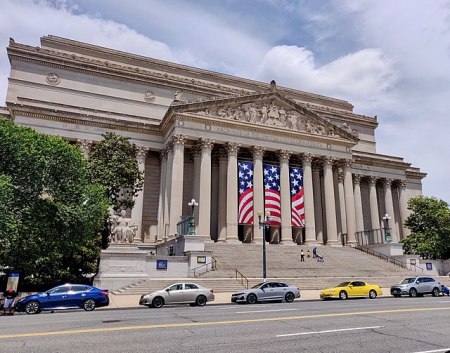National Archives settles suit with visitors asked to hide pro-life messages

The National Archives has reached a settlement with March for Life attendees who sued because security officials told the activists they could not wear pro-life apparel inside the building.
The American Center for Law and Justice, which filed a complaint against the institution earlier this year, announced in a statement that several of its clients reached a settlement with the National Archives and Records Administration. The National Archives and Records Administration runs the National Archives, a Washington, D.C.-based museum that hosts original copies of the U.S. Constitution and other historic documents.
The National Archives faced the complaint after plaintiffs Tamara R. and her minor daughter, as well as Wendilee Walpole Lassiter and Terrie Kallal, were asked to remove apparel and clothing displaying pro-life messages as they toured the facility while in town for the annual March for Life in January.
One of the pieces of clothing in question read “MARCH 4 LIFE 2014: Saint Cecilia’s Youth Group, Glen Carbon, IL.”
The plaintiffs were told by a security officer working at the museum to either remove the clothing or leave, citing concerns that it would “incite” others. Eleven months later, the National Archives, NARA and the Archivist of the United States agreed to pay the plaintiffs $10,000 to “settle every claim of any kind relating to this civil action.”
The monetary payment is one of several aspects of the Voluntary Stipulation of Settlement and Dismissal filed in the U.S. District Court for the District of Columbia on Monday.
The defendants also agreed to make available to the plaintiffs and their attorneys video footage of the events that unfolded on Jan. 20, the day of the March for Life, when they were asked to remove articles of their clothing with a pro-life message.
Micah Cheatham, the chief of management and administration at NARA, outlined the actions taken by his agency to address the wrongs done to the plaintiffs earlier this year and to prevent them from happening again in an affidavit filed Monday.
Specifically, he noted that “the Acting Archivist of the United States, who was at that time the interim head of NARA, issued a public apology to Plaintiffs through a press release to major media outlets and posted the apology to NARA’s public website.”
Additional steps taken include the establishment of “guidance reminding all NARA employees of the First Amendment rights of visitors to NARA facilities” and the consent order NARA entered into with plaintiffs vowing that “no future visitors will be prohibited from wearing t-shirts, hats, buttons, or other attire that displays protest language, including religious and political speech.”
After sharing the consent order with NARA staff, the agency apologized to Lassiter in person and offered her an exclusive tour of the museum.
The tour Lassiter received included the opportunity to view “records of high intrinsic value that are not normally made available to the public.” Additionally, NARA “changed its procedures to require its federal employees to conduct periodic walk-throughs of the exhibit spaces in the National Archives Museum during their normal working hours on weekdays to evaluate the visitor experience.”
Instructions provided to NARA’s security force vendor Allied Universal Security highlight “Procedures for Visitors Engaging in Protected Activity, including Protests and Demonstrations.” The list declares that “All visitors inside and outside the building, including Protesters/Demonstrators, may wear t-shirts, hats, buttons, etc., displaying any words, symbols, and images, etc., that constitute constitutionally protected speech, including protest language, religious viewpoints, and profanity.”
The procedures stress that “separate rules apply to all NARA Research Rooms, which generally prohibit coats and hats because they present a security risk, unless they are considered a religious covering.” Cheatham also stated that “AUS removed the security supervisor who was at fault from working at NRA,” referring to the unnamed individual responsible for asking the plaintiffs to hide the pro-life messages on their clothing.
A consent order filed Tuesday asserts that defendants and their employees are “ENJOINED from prohibiting visiting members of the public to NARA facilities from wearing t-shirts, hats, buttons, etc., that display protest language, including religious and political speech.” It also indicated that NARA would agree to provide the minor daughter and Kallal with personal tours of the National Archives.
“This is an especially important victory, as one month from today, pro-life Americans will once again gather in Washington, D.C., for the March for Life,” said ACLJ Executive Director Jordan Sekulow. “Our victory today ensures that they will be free from harassment and that their First Amendment rights will be protected should they choose to visit the National Archives and view the very documents that protect those sacred rights.”
Ryan Foley is a reporter for The Christian Post. He can be reached at: ryan.foley@christianpost.com





















